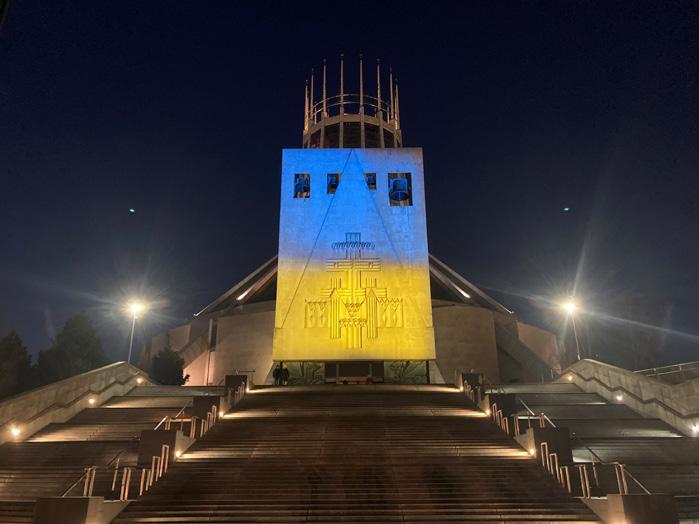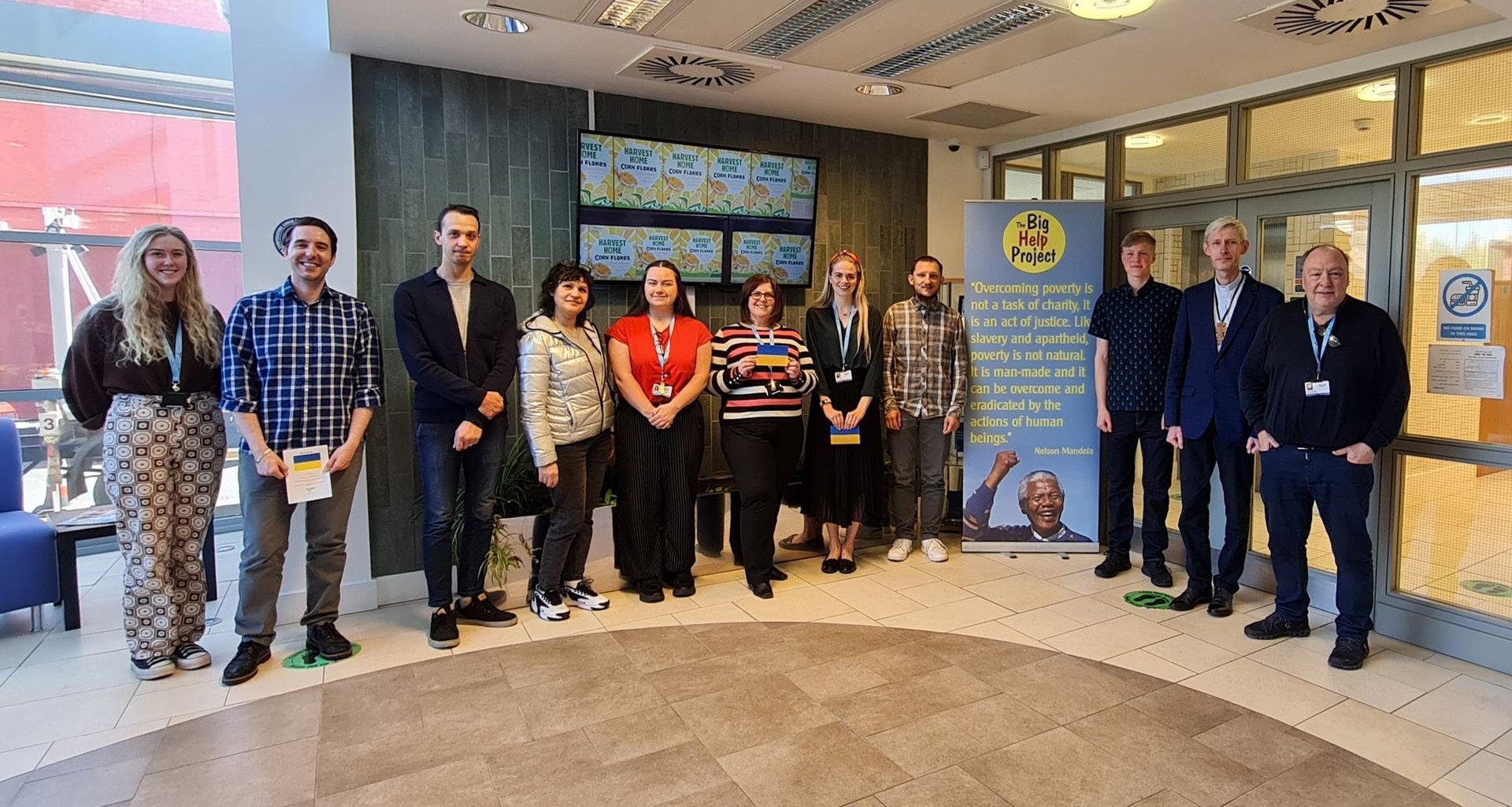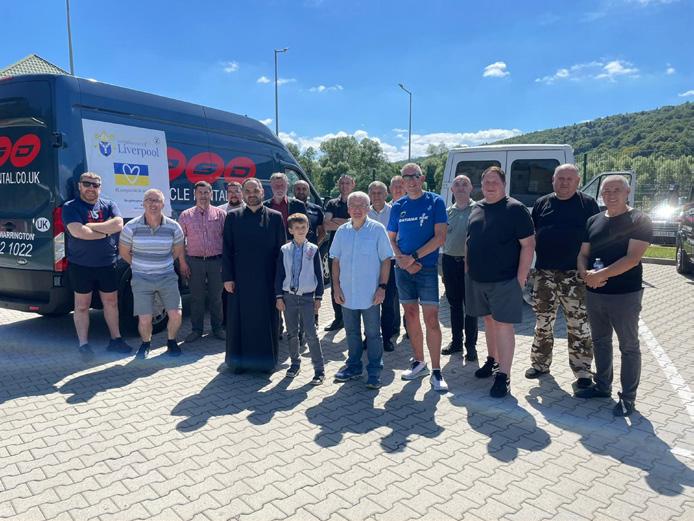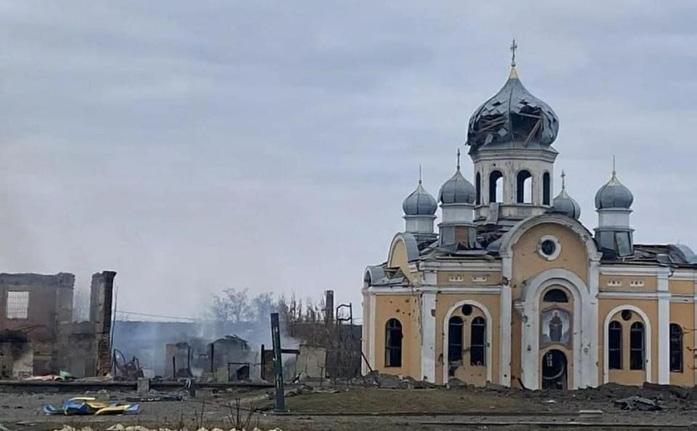
4 minute read
Anniversary vigil held for Ukraine Reflection on 12 months of solidarity and support
by Simon Hart
A vigil service at Liverpool’s two cathedrals on 24 February was a moment to reflect on 12 months of solidarity and support since Russia invaded Ukraine.
Advertisement
‘This vigil is an expression of our solidarity with the Ukrainian people, who are defending not only their own territorial integrity and statehood but also the fundamental values of our civilisation such as freedom and human dignity against the attacks of a ruthless authoritarian regime.’
In a reflection on the past 12 months he says that one positive thing has been ‘the help of local people and international communities, which is very important for Ukrainians’. On an international level this has meant crucial military support; on a local level here in Liverpool, it has found different forms of expression.
Fr Taras, who says a weekly Ukrainian-Catholic Mass at St Sebastian’s, Fairfield, cites the support of the Big Help Project, a Kensington-based charity which has made its premises available for weekly meetings of Ukrainian refugees. ‘Ukrainians can eat, they can socialise safely there,’ he explains. ‘There are items distributed. If anything is needed, they never say no.’
A Ukrainian children’s choir meets there too though, thanks to the help of benefactors, there are plans to set up a community centre in a building nearby. This will include a children’s playgroup, set up with a grant from the British Red Cross Refugee Fund (and accessed with help from the Community Foundations for Lancashire and Merseyside).
Archdiocese plays it part
These were the words of Rev Dr Taras Khomych, a priest in the Ukrainian-Catholic Church, as he reflected on the vigil held in Liverpool on Friday 24 February to mark the first anniversary since the Russian invasion of Ukraine.
The vigil began at 4.30 pm at Liverpool Metropolitan Cathedral Plaza and featured speakers from a range of faiths. It continued at Liverpool Cathedral at 5.30 pm with readings, prayers and Evensong sung by Liverpool Cathedral Choir. In addition, a Ukrainian Choir led a liturgy of the commemoration of the dead, whose number includes at least 8,000 civilians.
The vigil service was organised by Liverpool Cathedral and Liverpool Metropolitan Cathedral in co-operation with Fr Taras’s Ukrainian-Catholic parish in Liverpool and the Liverpudlian branch of the Association of Ukrainians of Great Britain which he helped to establish last June.

Fr Taras added: ‘As Christians, as people of faith, we believe in the power of prayer and we trust that these prayers will support Ukraine and this wonderful expression of sympathy and solidarity with Ukraine will eventually lead to Ukraine’s victory.’
Fr Taras, resident in Liverpool since 2012 is a lecturer at Liverpool Hope University – in Early Christian Literature and Byzantine Theology – while also serving as chaplain at St Edward’s College. His parents, both in their 70s, remain in Lviv in western Ukraine.
He recalls his incredulity when the news broke that his home country had been invaded by Russian forces on 24 February last year. ‘Even on the 23 February I did not imagine that this would happen,’ he says. Equally, he ‘could not imagine that Ukraine would be able to withstand the attacks of Russia and not only withstand the attack but push back.’
The Archdiocese of Liverpool has played an active role too. Archbishop Malcolm McMahon OP launched an urgent and major appeal to support Ukraine and in the last year the #Liverpool4Ukraine appeal has raised over £155,500 and volunteers have driven 12 trucks of aid to the Polish-Ukrainian border over four separate journeys. This aid has been collected by Bishop Gregory Komar, from the Ukrainian diocese of SambirDrohobych, and taken for distribution in the Lviv region.
The archdiocese is grateful for the co-operation provided by Greenmount Projects and the Wrightington, Wigan and Leigh NHS Foundation Trust which have provided building tools and medical aid respectively.
For the Ukrainian community in Liverpool, the connection with their adopted city will be further enhanced by the upcoming staging of the Eurovision Song Contest on 13 May. Liverpool is hosting the contest because Ukraine, victorious in last year’s event, is unable to because of security concerns.
Fr Taras explains that he is sitting on two committees focused on cultural and educational programmes taking place around the contest.
He says: ‘There will be workshops in schools for painting Easter eggs, which is a Ukrainian tradition. There will be huge Easter eggs painted by Ukrainian children and some other children and these will be exhibited during Eurovision in central parts of Liverpool.’
In addition, 15 Ukrainian children have been invited to join a choir of 100 schoolchildren who will learn a selection of European songs – including two from Ukraine – and perform them in the lead-up to Eurovision.


Fr Taras also cites the plan for a Ukraine-themed artwork in the Anglican Cathedral. ‘It is a simulation of a train which moves from the Eastern part of Ukraine to the west and it shows different scenes as if you were watching from the window of the train.’
Back at the other end of Hope Street, the vigil that began at the Metropolitan Cathedral on 24 February was a moment to ponder the solidarity which has grown over these past 12 months, as well as to pray for those who have lost their lives and for an outcome which brings peace and stability to Ukraine.
Canon Anthony O’Brien, Dean of the Metropolitan Cathedral, said, ‘As a Cathedral and diocese we have close links with the Ukrainian community here on Merseyside and strong links with a Catholic Diocese in Ukraine.
‘As we mark the first anniversary of the invasion of their sovereign territory, we stand with our Ukrainian brothers and sisters to pray for an end to the conflict, for peace and for a just settlement. We remember also the many innocent people who have lost their lives as a result of this war over the last 12 months.’

It is a war, Fr Taras remarks, which has cast his country into darkness. And yet light remains. ‘For me personally all of this just sharpens the difference,’ he concludes. ‘On the one hand, the war shows atrocity and this dark side of humanity. On the other hand, it shows God’s faith is in so many who selflessly sacrifice themselves either on the front line or in helping others.’









